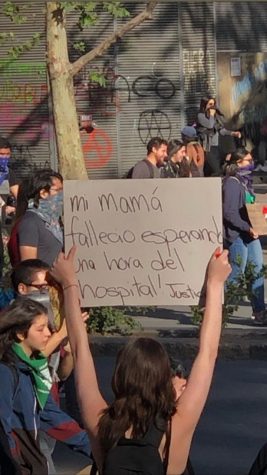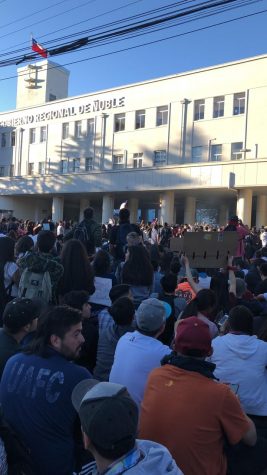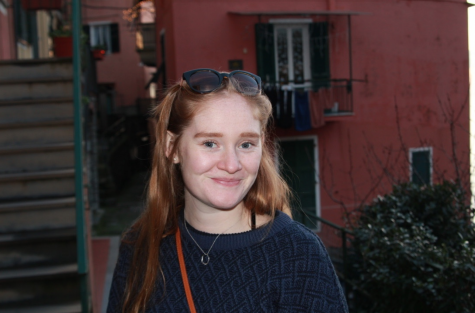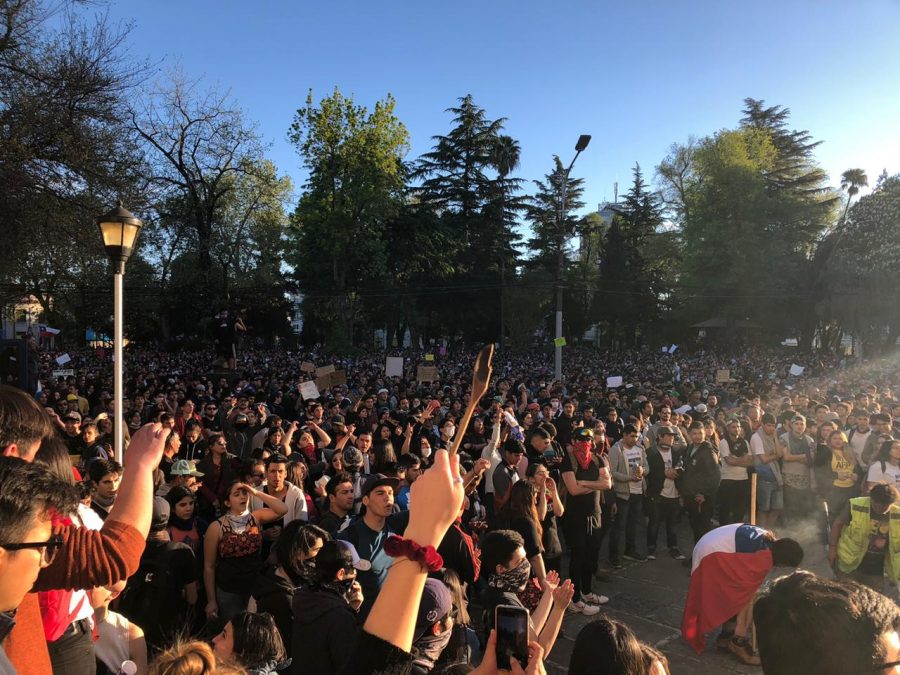Linfield study abroad student amidst chaos of Chilean protests
Desplace para la versión en español
Latin America’s most stable nation has erupted in protest the last few weeks following a government initiative to raise the prices of metro fares in its capital.
Jake Barlow, a Linfield junior currently studying abroad in Chile, was on vacation the weekend before the protests started and just barely made it back to his house before hundreds of flights and bus rides were canceled.
Though the raise in metro tickets sparked the movement, it has grown into a greater fight against the socio economic burdens that many Chileans carry every day. High costs of education and healthcare combined with low pensions and salaries are the heart of it all, while the proposed metro prices have been described as the drop that tipped the glass over.

“My mom died waiting for a doctor’s appointment. Justice!”
Extremists have set metro stations, stores and high-rise buildings ablaze, compelling President Sebastián Piñera to declare a state of emergency in many major Chilean cities, including its capital Santiago. According to a BBC report, over 7,000 people have been detained and at least 16 have died since the protests began.
In the violence of it all, the president has sent tanks and military personnel to the streets to maintain the order of the city, even implementing a strict curfew. Many videos have surfaced on Instagram of officers deploying tear gas into crowds and beating protestors.
“Overall several deaths have taken place, people have been beaten and many people are missing,” Barlow said. “The sad part is that much of the news here is focusing on the negative aspects such as rioting and burning without showing the large and wide array of peaceful protests and marches.”
“I think violent protests may not be the best way to go about it, however, I am trying to be understanding of the struggles and frustrations that have allowed these emotions to cultivate and cause such unrest and hope that everything can be resolved as quickly as possible,” he continued.
Many more protestors have done so peacefully: singing, marching, and tapping wooden spoons against fry pans in remembrance of those who demonstrated during the days of the Chilean dictatorship, which was the worst humanitarian crisis in the country’s recent history.
Catalina Salinas Pino is a second year English major at la Universidad San Sebastián in Concepción, Chile.
“I think that the violent protests don’t contribute to anything. Burning the metro stations and stores doesn’t add to anything because it only produces more mayhem. I’m in support of the peaceful protests because I think we all have the right to demonstrate,” she said.
Many Chileans have expressed their discontent for the president, on social media and on hand-painted signs they’ve packed through the streets, with slogans that read “Renuncia Piñera,” (“Piñera, resign”) and “No estamos en guerra” (“We’re not at war”).
On Oct. 25, an estimated one million people peacefully gathered in the capital to support the social reform they’ve been campaigning for in the last few weeks.
“I personally am marching for the people that haven’t had the same opportunities that I’ve had in life, who haven’t had the same privileges. Because I think that all of them should have a quality education and quality healthcare,” Salinas Pino said.
For Barlow, being a foreigner in a country during this pivotal political moment has been difficult.
“I feel a bit lost in the midst of something where I don’t belong,” he said. “I am in group chats with friends and classmates who demonstrate their passions and frustrations over everything happening here in Chile and I can’t help but feel like a helpless bystander watching those around me who are struggling to fight for a new and better Chile.”
President Piñera has agreed to suspend the hike in metro prices, but there is no sign of his constituents forfeiting the political momentum they have created for themselves.
***
Estudiante en medio del caos en Chile
durante las manifestaciones
El país más desarrollado en América Latina ha estallado en protestas en las últimas semanas a través de una iniciativa gubernamental de subir los precios de los pasajes del metro en la capital.
Jake Barlow, en su tercer año en Linfield, está estudiando en Chile ahora. Se fue en un viaje el fin de semana antes del comienzo del movimiento y apenas volvió a su casa antes de que cancelaran muchos vuelos y viajes en autobús.
Ya que este aumento ha instigado el movimiento, se ha convertido en una lucha contra las desigualdades socioeconómicas que tienen muchos chilenos en su país. El costo alto de la educación formal y seguro médico en combinación con pensiones y salarios bajos están en el centro de las protestas. El precio elevado de los pasajes del metro se describe como la gota que hizo caer el vaso.
Los anarquistas han quemados muchas estaciones de metro, unas tiendas y otros edificios en muchos lados de la ciudad. Por eso, el presidente Sebastián Piñera declaró un estado de emergencia en muchas ciudades prominentes en el país, Santiago incluido. Según un reportaje de BBC, hay más de 7,000 personas detenidas y por los menos 16 personas muertas desde el comienzo de las manifestaciones.
Dada la violencia, el presidente puso los tanques y muchos milicos del Ejército de Chile en las calles para controlar el caos, incluso implementó un toque de queda en muchas ciudades. Hay muchos videos en Instagram y otras plataformas donde se puede ver los militares desplegando las bombas lacrimógenas o pegando a los ciudadanos.
“En total, han habido unos muertos, y la gente ha sido maltratada, hay desaparecidos,” dijo Barlow. “La parte más triste es que las noticias aquí están enfocándose en todos los aspectos negativos como los disturbios y los incendios provocados sin mostrar las protestas pacíficas.”
“Pienso que las protestas violentas no son la mejor manera para manifestarse, sin embargo estoy tratando de entender los desafíos que han permitido que las emociones lleguen a tal punto de descontento y ojalá que todo se resuelva pronto,” continuó.
Mucha gente se ha manifestado de manera pacífica: cantando, marchando, y tocando música con sartenes y cucharas de madera como símbolo de las personas quienes marcharon durante los días de la dictadura chilena y lo que fue la peor crisis de los derechos humanos en la historia reciente del país.

La gente se juntó delante del Gobierno Regional de Ñuble en Chillán, Chile, dónde Linfield tiene un sitio de intercambio
Catalina Salinas Pino está en su segundo año en la Universidad San Sebastián in Concepción, Chile, estudiando la Pedagógica en Inglés.
“Yo pienso que las protestas violentas no contribuyen a nada,” dijo ella. “Pienso que al quemar el metro, quemar los locales no aporta nada porque solo produce más destrozos. Yo estoy a favor de las protestas pacíficas porque creo que todos tenemos el derecho de manifestarnos.”
Muchos chilenos han expresado su desprecio por el presidente, en las redes sociales o en los carteles hecho a mano llevados por las calles, con frases como “Renuncia Piñera” y “No estamos en guerra.”
El viernes, más de un millón de personas se juntaron en la capital para apoyar la reforma social de lo que han estado luchando en las últimas semanas.
“Yo personalmente me manifiesto por la gente que no ha tenido las mismas oportunidades que tenía yo en la vida, que no ha tenido los mismos privilegios,” dijo Salinas Pino. “Porque creo que todos deberían tener una educación de calidad y una salud de calidad.”
Para Barlow, ser un extranjero en Chile durante este momento histórico y político ha sido difícil.
“Yo me siento perdido en medio de algo de lo que no pertenezco,” él dijo. “Estoy en unos grupos [de Whatsapp] con amigos y compañeros de la universidad que están manifestando sus pasiones y frustraciones de lo que está sucediendo acá en Chile y me siento como un transeúnte impotente, viendo los que están alrededor de mí luchando por un Chile mejor y nuevo.”
Presidente Piñera ha suspendido el aumento de los pasajes del metro, pero parece que la gente de Chile no le va a devolver su momento político que ya ha ganado.



Margaret braun • Oct 30, 2019 at 8:56 pm
Ms Botello should be proud of her insightful, factual and heartfelt reporting of this turbulent time in her adopted country. I do worry for this young woman going out observing, interviewing and reporting amidst this turmoil and can only hope she is taking every precaution to be safe despite the sometimes dangerous position she may find herself in while reporting. May God protect her and keep peace in Chile.
Steve Bagwell • Oct 30, 2019 at 7:54 pm
Very impressive work. Translation is a nice touch to enrich the end result.